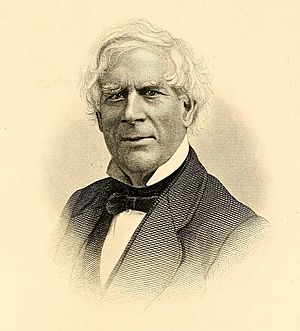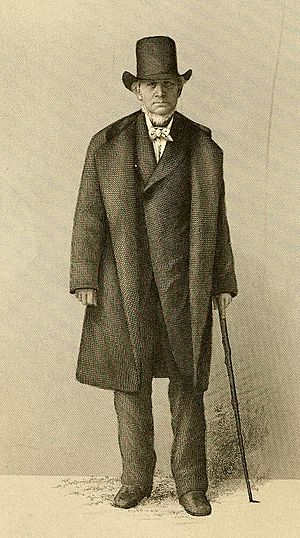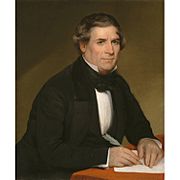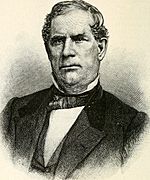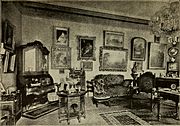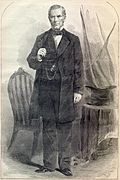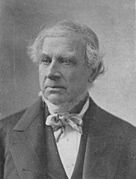Thurlow Weed facts for kids
Quick facts for kids
Thurlow Weed
|
|
|---|---|
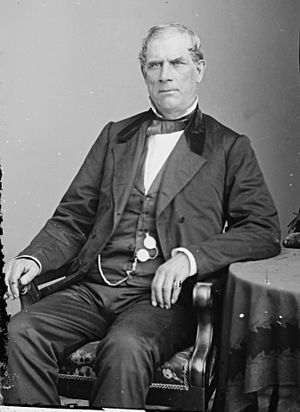
Weed at the height of his influence, circa 1860. Brady-Handy photograph, Prints and Photographs Division, Library of Congress.
|
|
| Member of the New York State Assembly from Monroe County | |
| In office January 1, 1830 – December 31, 1830 Serving with Ezra Sheldon Jr., Joseph Randall
|
|
| Preceded by | John Garbutt, Heman Norton, Reuben Willey |
| Succeeded by | Samuel G. Andrews, Isaac Lacey, Peter Price |
| In office January 1, 1825 – December 31, 1825 Serving with Gustavus Clark, Henry Fellows
|
|
| Preceded by | Peter Price, Major H. Smith, Enos Stone |
| Succeeded by | Henry Fellows, Isaac Lacey, Vincent Mathews |
| Personal details | |
| Born |
Edward Thurlow Weed
November 15, 1797 Cairo, Greene County, New York |
| Died | November 22, 1882 (aged 85) New York City, New York |
| Resting place | Albany Rural Cemetery |
| Political party | Democratic-Republican Adams Republican Anti-Masonic Whig Republican |
| Spouse | Catherine Ostrander (m. 1818-1858, her death) |
| Relations | William Barnes Sr. (son-in-law) William Barnes Jr. (grandson) Catharine Weed Barnes (granddaughter) |
| Children | 4 |
| Occupation | Printer, publisher and editor |
| Signature | |
| Military service | |
| Allegiance | United States New York |
| Branch/service | New York Militia |
| Years of service | 1812-1814 |
| Rank | Sergeant |
| Unit | 40th Regiment |
| Battles/wars | War of 1812 |
Edward Thurlow Weed (November 15, 1797 – November 22, 1882) was an important American figure. He was a printer, newspaper publisher, and a key politician. He belonged to the Whig and Republican parties. Thurlow Weed was a main advisor to William H. Seward, a powerful New York politician. He also helped choose presidential candidates like William Henry Harrison (1840), Zachary Taylor (1848), and John C. Frémont (1856).
Weed was born in Cairo, New York. He learned the printing trade and served in the War of 1812. Later, he was elected to the New York State Assembly. There, he met William Seward, and they became close political friends. Weed and Seward became leaders of the Anti-Masonic Party in New York. Weed started the Albany Evening Journal newspaper for the party. He supported Henry Clay's "American System" economic plan. He also helped create the Whig Party in the 1830s. Weed helped Seward become Governor of New York. He also supported Harrison and Taylor in their successful presidential campaigns.
Weed led New York's Whigs for many years. But he left the party after the Kansas–Nebraska Act was passed. He then helped start the Republican Party. He supported Frémont for president in 1856. In 1860, he tried to get Seward nominated for president. However, the convention chose Abraham Lincoln instead. After the American Civil War, Weed and Seward supported President Andrew Johnson. They agreed with Johnson's plans for Reconstruction. Weed retired from public life in 1867 and passed away in 1882.
Contents
Early Life and Education
Thurlow Weed was born on November 15, 1797. His birthplace was Acra, a small area in Cairo, New York. His parents, Joel and Mary Weed, were farmers from Connecticut. Thurlow was the oldest of their five children. His family often struggled with money.
When he was young, Weed's family moved to Catskill. His father worked hauling goods by wagon. But his father's business faced problems, including illness and accidents. Thurlow Weed had about a year of formal schooling. He started working at age eight to help his family. He worked as a blacksmith's helper and an errand boy. He also worked as a cabin boy on boats on the Hudson River.
The Weed family moved again to Cincinnatus, New York, and then to Onondaga. Thurlow worked hard to learn on his own. He would walk miles to borrow books from neighbors. He also worked at an iron forge. For a few months, he attended a private school.
Starting a Career in Printing
Becoming a Printer
In 1810, Weed decided he wanted to be a printer. He became an apprentice at a newspaper called the Lynx in Onondaga. He learned many tasks, from cutting wood to preparing ink. He also helped organize newspaper files. This helped the Lynx share stories with other papers.
The Lynx closed down in 1812. Weed then worked briefly at another newspaper, the Tocsin, which also closed. He returned to the iron forge. He saved enough money to look for printing work again. He found a job at a printing shop in Utica.
Military Service in the War of 1812
In 1813, Weed was working for William Williams in Utica. He joined a volunteer militia during the War of 1812. His company responded to threats from the British near Sackets Harbor. After the threat passed, he returned to Utica.
Weed joined the militia again later that year. He served near Sackets Harbor once more. In October 1814, he joined the militia for a third time. He was a quartermaster sergeant. His regiment helped prevent British troops from landing. In January 1815, his regiment finished its service. Weed then went back to Utica.
Continuing His Printing Work
After the war ended, Weed moved to Albany. He worked at the Albany Register newspaper. In 1816, he moved to the Albany Argus. This newspaper had a big contract to print state documents. This job doubled his salary and sparked his interest in politics. He started attending state legislature meetings.
Weed also worked in New York City for a time. He worked for several book publishers. He often went to the theater and watched political meetings. In 1817, he returned to Albany. He became a foreman at the Albany Register. He started writing editorials on political topics. He became very good at writing and setting type quickly.
In 1818, Weed bought a newspaper in Norwich called the Agriculturist. He also got a state job that helped him earn extra money. By 1820, Norwich could not support two newspapers. Weed sold his business and returned to Albany.
He found work at the Albany Argus again. But he was fired because he supported DeWitt Clinton, a political leader. He then sold subscriptions for other publications. In 1821, he bought a printing press in Manlius. He started his own newspaper, the Onondaga Republican.
While in Manlius, Weed became friends with Addison Gardiner. Gardiner suggested Weed move to Rochester. Weed closed his paper and moved there. He worked for the Telegraph, Rochester's pro-Clinton newspaper. He quickly became the manager and editor. He made the Telegraph an important voice for Clinton.
In 1843, Weed, his son James, and John D. Parsons started a successful book publishing company in Albany. It was called Weed, Parsons & Company.
Beginning His Political Journey
Early Political Steps
In 1824, Thurlow Weed strongly supported John Quincy Adams for president. His newspaper, the Rochester Telegraph, backed Adams. Weed also helped Rochester get a charter for a new bank. He attended the state legislature meetings for this.
Weed was nominated to the New York State Assembly. He won by a large margin. He served in the Assembly in 1825. During this time, he became friends with William H. Seward. Seward was just starting his legal and political career.
In 1825, Weed bought the Rochester Telegraph. In 1827, he got involved in the mystery of William Morgan. Morgan was a former Mason who planned to reveal Masonic secrets. Weed saw this as a chance to oppose Andrew Jackson and Martin Van Buren. He helped form the Anti-Masonic Party. He used his newspaper to keep Morgan's disappearance in the news.
Rise of the Anti-Masonic Party
Many people thought Morgan had been killed by Masons. When a body washed ashore, many believed it was Morgan. Even though it was identified as someone else, many Anti-Masons still believed it was Morgan. Weed was said to have called it "good enough Morgan" to keep the controversy going. He denied saying this.
In 1828, Masons forced Weed out of the Telegraph. In 1829, he was elected to the Assembly again as an Anti-Mason. He served in 1830. He also started the Albany Evening Journal. This newspaper became the biggest Anti-Masonic paper. Weed was its editor and main political expert.
In 1832, Weed supported Henry Clay for president. Clay was the candidate for the National Republican Party. Weed strongly supported Clay's "American System." This plan included a national bank, better roads and railroads, and protective tariffs.
Leading the Whig Party
By 1834, the National Republicans were becoming the Whig Party. Most Anti-Masons joined the Whigs. They saw the Whigs as the best choice against Jackson and Van Buren. This allowed Weed to become a leader in this new party. His Evening Journal became the main Whig newspaper. By the 1840s, it was one of the most popular political newspapers in the U.S.
Weed and other Whigs blamed the Democratic Party for the Panic of 1837. In 1838, Weed was a key supporter of William H. Seward's successful campaign for governor. Many gave Weed credit for Seward's win. Weed also strongly supported William Henry Harrison's successful presidential campaign in 1840. Harrison became the first Whig president.
In the 1830s and 1840s, Weed became active in the movement to end slavery. He helped Stephen Myers raise money for the Underground Railroad. Weed and his wife also opened their home to runaway slaves.
A Powerful Political Organizer
Weed was known as the "boss" of New York's Whig Party. He used political favors to gain support. He also used the Evening Journal to strengthen his influence. Under Weed's leadership, the Whigs became very strong in state politics. Weed was one of the most powerful politicians in New York.
Weed was a practical politician. He usually avoided controversial issues that might hurt Whig support. However, he did speak out against slavery. He tried to use moderate language, not the most extreme words of some abolitionists.
President Harrison died in 1841. John Tyler became president. Tyler disappointed Weed by not following Whig policies. Weed supported Clay in 1844, but Clay lost. After the Mexican–American War, Zachary Taylor became a likely Whig presidential candidate. Weed supported Taylor, who won. But Taylor also died in office.
Weed played a big part in creating the New York Central Railroad. This became the largest company in the U.S. at the time. Weed helped this happen as a favor to his friend Erastus Corning, even though Corning was a Democrat.
Weed used his political power to improve New York City. In 1847, he helped make Castle Garden the main place for immigrants to arrive. He also helped pass laws to protect immigrants. In the 1850s, he helped create the New York Harbor Commission. This group worked to improve New York City's waterways. When Central Park was built in 1855, Weed helped choose the first park commission. He also influenced reforms for prisons and charities. He helped create the Board of Charities and Correction for New York City. Weed also helped reform the New York City Police Department.
The 1852 Presidential Campaign
In 1852, the main Whig candidates for president were Millard Fillmore, Daniel Webster, and Winfield Scott. Fillmore had become president after Taylor died. He did not want Weed's advice. So, Weed refused to support Fillmore. Instead, he backed Scott. Seward also supported Scott.
Weed believed the Whig Party was falling apart because of the Compromise of 1850. He thought they would lose the election. To avoid blame, he took a long trip to Europe. He visited England, France, and Germany. He stayed for over a year, even after the November 1852 election. Democrat Franklin Pierce won that election.
Leading the Republican Party
Founding the Party
When Weed returned to the U.S., the Whig Party had split. This happened because of the Kansas–Nebraska Act. Southern Whigs joined the Democrats. Northern Whigs, including Seward, formed the Republican Party. This new party was against slavery. Weed joined the Republicans. The Evening Journal became a leading Republican newspaper. Weed supported Seward's re-election to the Senate in 1854. He also supported John C. Frémont for president in 1856. Frémont lost the 1856 election to Democrat James Buchanan.
The 1860 Election
President Buchanan's time in office was difficult. The Democrats were also divided over slavery. This made a Republican victory likely in 1860. Weed worked hard to get Seward nominated for president. Many thought Seward's nomination was certain.
However, Seward's strong anti-slavery views and his reputation as a political boss upset many new Republicans. Abraham Lincoln's campaign managers used these weaknesses. They managed to get Lincoln nominated instead. Even though he was disappointed, Weed supported Lincoln in the election. Lincoln won easily.
During the Civil War
After Lincoln became president, Seward became Secretary of State. Weed became an unofficial helper and advisor. Both Weed and Seward gave important support to Lincoln and the Union during the American Civil War.
In 1861, Weed traveled to Paris with Winfield Scott. They helped solve a problem with Britain called the Trent Affair. Later that year, Weed visited Europe again. He worked to get support for the Union in England and France.
In 1863, Lincoln asked Weed to secretly raise $15,000 for an unknown purpose. Weed raised the money, but Lincoln never explained why he needed it.
Weed did not agree with Lincoln's Emancipation Proclamation. He thought it was too extreme. He argued for a slower way to end slavery. In early 1863, he retired as editor of the Evening Journal. He disagreed with the Radical Republicans' views on the war and Reconstruction. He did not want to make his disagreement public.
After Lincoln's death, Weed and Seward supported President Andrew Johnson. They disagreed with the Radical Republicans. They supported Johnson's more moderate approach to Reconstruction.
Later Years and Retirement
In 1867, Thurlow Weed retired from public life. He moved from Albany to New York City. He briefly owned and edited a newspaper called the Commercial Advertiser. He stayed somewhat involved in politics but did not have as much power as before. He supported President Ulysses S. Grant.
In his later years, Weed wrote many letters to authors. He gave them information about New York's history. He also worked on his autobiography, which his daughter Harriet published in 1883. His grandson, Thurlow Weed Barnes, also wrote a biography of him in 1884.
Death and Burial
Thurlow Weed became ill in his final months. He suffered from blindness and dizziness. He passed away in New York City on November 22, 1882. His funeral was held at the First Presbyterian Church in Manhattan. Many important people attended his funeral. He was buried at Albany Rural Cemetery.
Family Life
On April 26, 1818, Thurlow Weed married Catherine Ostrander. They had agreed to marry in 1814. But her parents wanted them to wait until they were older and Weed was more settled. They had four children: James Birdsall, Harriet Ann, Emily, and Maria.
Weed's grandson, William Barnes Jr., later owned the Albany Evening Journal. He also became a long-time leader of New York's Republican Party. Weed's granddaughter, Catharine Weed Barnes, was a famous photographer.
Another grandson, Thurlow Weed Barnes, wrote a book about his grandfather. He also worked as a publishing executive. He had business interests in China, operating a railroad.
Images for kids
-
Chester Harding portrait of Weed in 1843
-
Weed illustration in the November 21, 1861 issue of Harper's Weekly
 | Kyle Baker |
 | Joseph Yoakum |
 | Laura Wheeler Waring |
 | Henry Ossawa Tanner |


